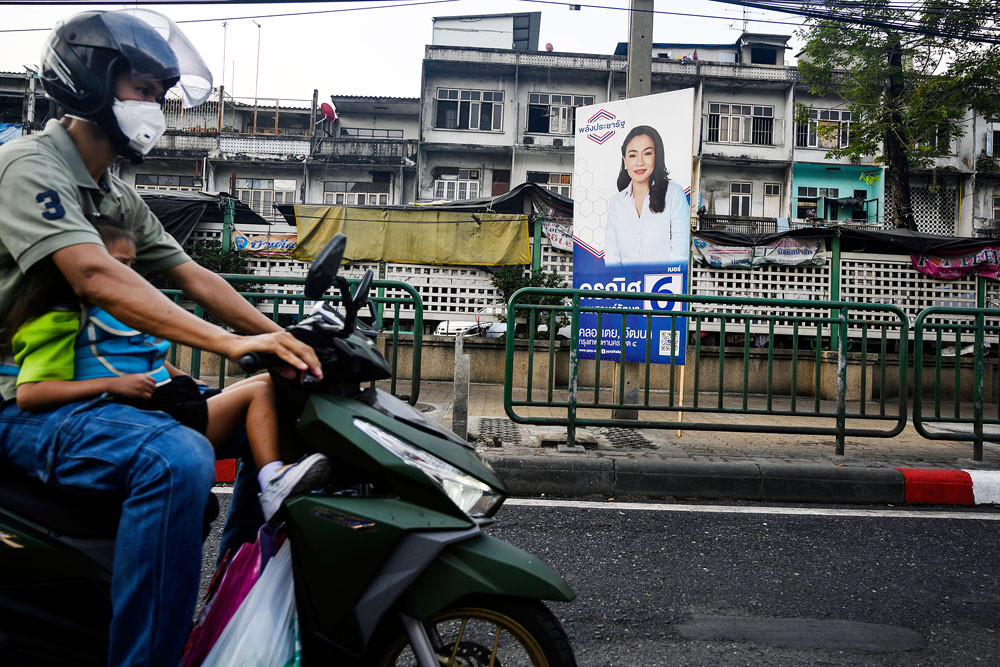Popular Reads
Top Results
Can't find what you're looking for?
View all search resultsPopular Reads
Top Results
Can't find what you're looking for?
View all search resultsThais wont mobilize in protest even if junta wins elections
Thailand’s ersatz elections will not bother most Thais even if army comes back to rule.
Change text size
Gift Premium Articles
to Anyone
E
very country has their breaking point, where corruption, abuse and living standards reach a point where people are compelled to take to the streets and demand a change.
Thailand’s breaking point appears to be much higher than most.
After all, a decade of political infighting, street riots, and military crackdowns has made mass protest much less palatable for the common Thai.
Despite this, the military seem to be doing their utmost to push the populace to their limit.
Reports from early and overseas voters tell of an election deeply flawed with spoiled ballots, discounted votes and confusing polling procedures.
Some votes have been disregarded altogether, including those that voted for the Thai Raksa Chat Party who was disqualified by the Election Commission for running a princess to be prime minister. Those who voted for the anti-junta party will not get a revote and their voices will not count.
Hardly Surprising
Of course, these small, some would almost say petty, attempts at undermining the democratic process should hardly be surprising given even a cursory view of the Thai political landscape.
This is the same military that pushed through a constitution that allows for 250 military-appointed senators to vote for the prime minister. What this means is that the military aligned party only have to win a fraction of the electorate to get their choice of premier, in this case junta-chief Prayuth Chan-ocha.
This is the same military that has weather corruption allegations at the highest level including multi-billion-baht national parks, multi-million-baht luxury watches and other procurement abnormalities that a normal democratic government would not have survived.
Given that the previous, democratically-elected, government was run out of town, its leaders tried and found guilty for corruption, one wonders if the same rigorous application of the law could be applied to the military if they lose Sunday’s election.
Simple Explanation
The short answer, of course, is no. The law is never applied evenly in Thailand’s governing structure. The rules and regulations one holds for the evil, corrupt politicians do not apply to the steadfast defenders of nation and religion. The men in green are held to a different standard because, in short, they have the guns and tanks.
Is there any other explanation for the ridiculous number of coups that Thailand has experienced over the course of 20th and 21st century? Why has no democratic government that have come after military rule ever hold the coup-leaders accountable?
While the military may not be a homogeneous, unified entity (it has in the past dissolved into factionalism), it would undoubtedly unite to oppose any attempt a civilian government might make to prosecute past coup-leaders. A civilian government that moved against the military would undoubtedly be overthrown in yet another coup.
Progress despite chaos
Yet even as the military reserves its right to intervene in politics at its discretion, Thailand has rapidly modernized in the last 50 years. The standard of living for Thais have never been higher and all qualitative social and economic measures trend upward. Purchasing power parity, literacy, life expectation, infant mortality, access to healthcare, Thais living in 2019 share little in common with Thais living in 1959.
That is not to say that Thailand is not without its problems. The country continually ranks among the worst in terms of income disparity and inequality indicators. But overall, Thais have seen their country progress rapidly, oftentimes in spite of the country’s turbulent politics.
Will it change?
This brings us back to the breaking point theory. Simply put, Thailand’s standard of living, access to healthcare and food, is too decent to ferment wholesale revolution like those we saw during the Arab Spring.
Combine this with the military’s willingness to use its guns and tanks on its own populace, the public’s lack of engagement with a civil society, and it is unlikely that Thailand will mobilize in mass protest even if the army wins Sunday’s election.







